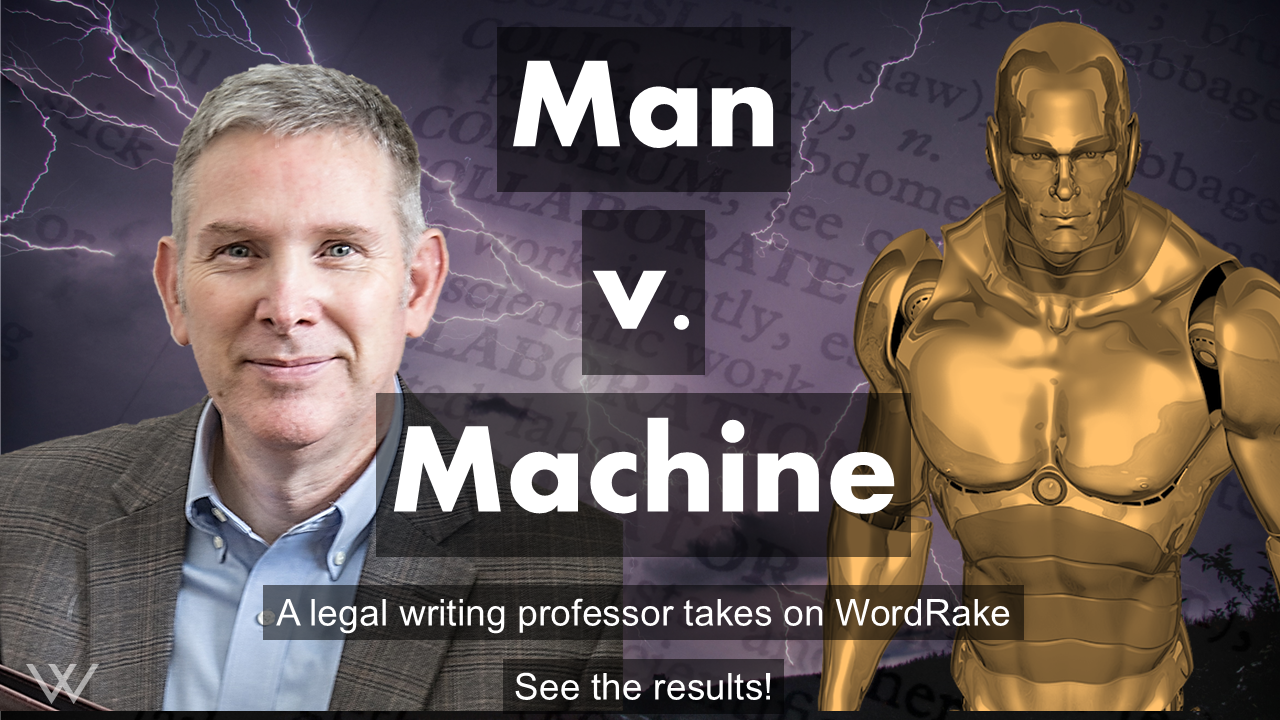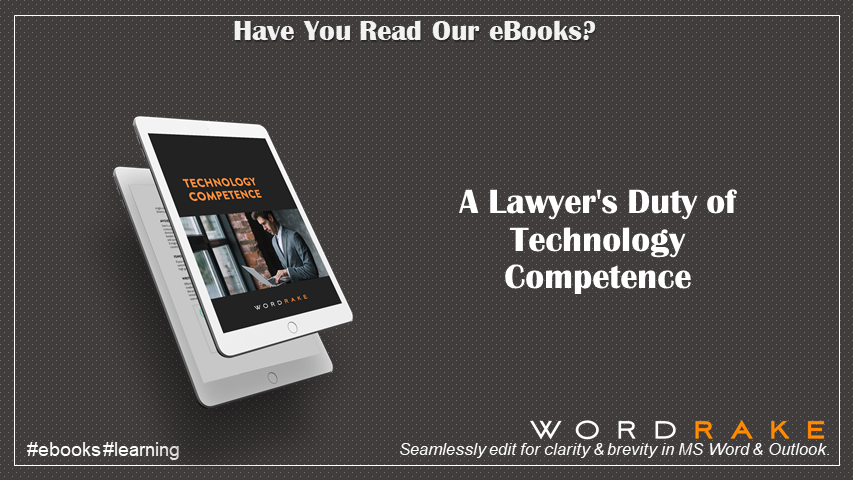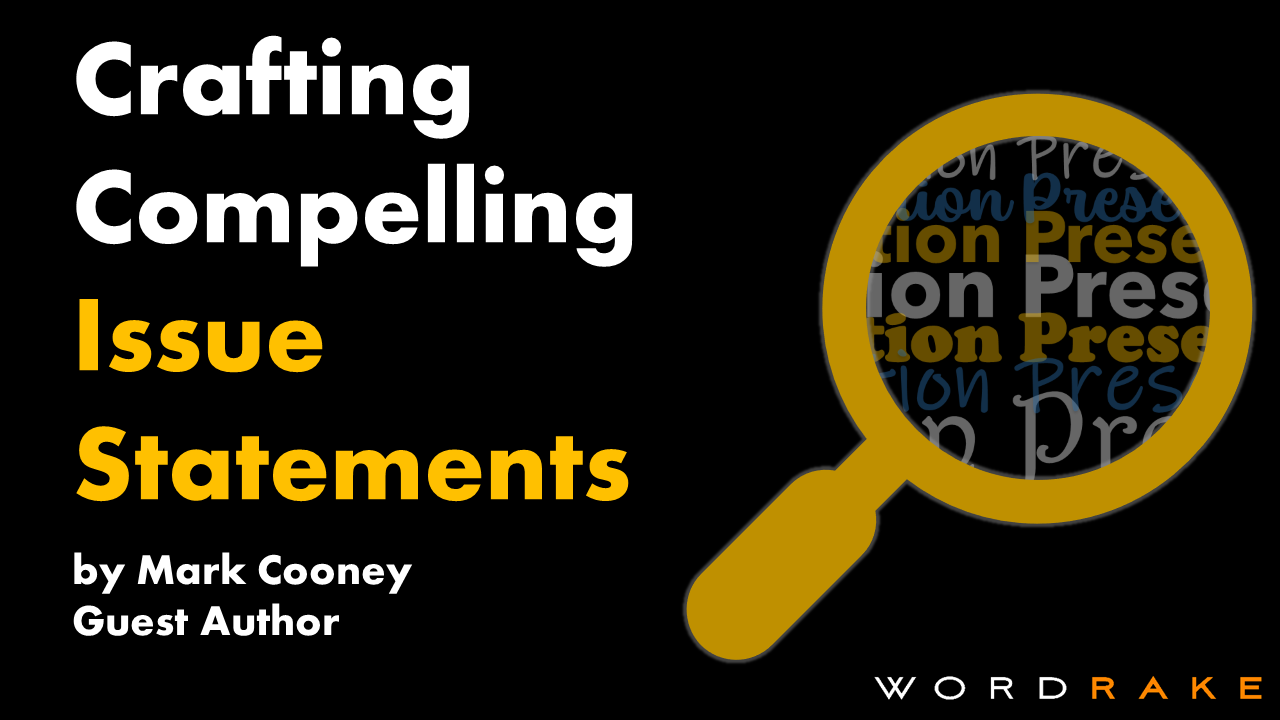The Tale of the Tape
In one corner, WordRake: editing software with more than 50,000 editing algorithms designed to improve clarity in professional prose.
In the other corner, me: legal-writing professor, Scribes Journal editor, former civil litigator, English teacher’s son.
The Match
Edit the same 807-word excerpt from a court opinion. Then compare edits and efficiency. Let the red ink fly, and may the best editor win.
Efficiency
I worked at a frenzied pace and finished editing the passage in 12 minutes. WordRake completed the task instantaneously, with one click of the Rake icon.
Suggestions
I made 35 suggestions. WordRake made 30 suggestions.
Word Count
My edits reduced the 807-word passage to 771 words, a 36-word reduction. WordRake’s edits reduced the passage to 776 words, a 31-word reduction.
Common Edits
Most of our edits were the same. Neither WordRake nor I had any patience for the court’s stuffy, unnecessary hereinafters within (arguably unnecessary) parentheticals. Examples:
Me:
Of particular relevance to the present dispute, Defendants Monroe County Board of Supervisors (hereinafter “County Board”) and Monroe County Soil & Conservation District (hereinafter “District”), received an easement on Plaintiffs' property, and subsequently later acted through their designated agent, Soap Creek Watershed Board (hereinafter “Soap Creek Board”), to direct the construction of the Watershed Project, including the Watershed Structure at the center of this dispute on Plaintiffs' property.
WordRake:
Of particular relevance to the present dispute, Defendants Monroe County Board of Supervisors (hereinafter “County Board”) and Monroe County Soil & Conservation District (hereinafter “District”), received an easement on Plaintiffs' property, and subsequently acted through their designated agent, Soap Creek Watershed Board (hereinafter “Soap Creek Board”), to direct the construction of the Watershed Project, including the Watershed Structure at the center of this dispute on Plaintiffs' property.
Nor did we tolerate pursuant to, a rote lawyerism that hurts flow:
Me:
- what was not permissible pursuant to under the easement on Plaintiffs' property
- removed the case to federal district court, pursuant to under 28 U.S.C. § 1442
WordRake:
- what was not permissible pursuant to under the easement on Plaintiffs' property
- removed the case to federal district court, pursuant to 28 U.S.C. under 28 U.S.C. § 1442
WordRake and I both revised wordy phrases and inflated diction. One common target was filed suit against:
Me:
- After sustaining these damages, Plaintiffs filed suit against sued the Contractor
WordRake:
- After sustaining these damages, Plaintiffs filed suit against sued the Contractor
Another common target was the cumbersome subsequently:
Me:
- received an easement on Plaintiffs' property and subsequently later acted through their designated agent
WordRake:
- received an easement on Plaintiffs' property and subsequently acted through their designated agent
WordRake is right: chronology is often clear without any adverb at all.
My (Painful) Misses
Did I mention that I worked really fast, trying to keep up with WordRake? Yet it still hurts to see that I missed some edits. But let me give credit where credit is due: these were good catches by a worthy opponent:
WordRake:
Plaintiffs complain of numerous many damages to their property as a result of because of the construction activities.
Comment:
I may surprise some by suggesting that when we’re at our editorial best, we pay attention not only to word count but, yes, also syllable count. Here, the simple many beats numerous by just one syllable, yet the improvement is real. It flows better.
The because of suggestion is even better. It cuts the wordy as a result of phrase in half. I should’ve caught that one. (The single word from might also work.)
WordRake:
NRCS and the Soap Creek Board entered into an agreement with contracted with Grooms & Co. Construction, Inc.
Comment:
Fabulous edit.
WordRake:
caused erosion of eroded Plaintiffs' property
Comment:
The original phrase is a glaring nominalization, yet I missed it. The author’s seeming desire for parallel structure lulled my hurried brain into editorial deference: “caused saturation and leakage of water at various parts of the Plaintiffs' property, caused erosion of Plaintiffs' property, and…”
My Hits
In a few spots (just a few), I suggested edits that WordRake bypassed:
Me:
played a significant role in both planning and supervising the Watershed Structure’s construction of the Watershed Structure.
Comment:
During final edits, question every of. Often, we can move the preposition’s object up in the sentence to create a possessive or to serve as an adjective. For instance, the verdict of the jury can be tightened to the jury’s verdict or the jury verdict.
Me:
The project involves the construction of constructing 154 flood water-detention dams in upland portions of the designated watershed area (hereinafter “Soap Creek Watershed”).
Comment:
Constructing replaces the nominalization the construction of. Also, the words water and detention form a phrasal adjective, which draws a hyphen. (WordRake and I both deleted the hereinafter. And WordRake simplified portions to parts, a good edit that I missed.)
Me:
wherein requiring the Contractor would to build the Watershed Structure in Monroe County
Comment:
WordRake bested me earlier in this sentence with its contracting with edit. But I caught wherein—which smacks of hardcore lawyerspeak—and replaced it. (Only Lord Tennyson’s ghost should use wherein.)
Split Decision
Minds may differ on whose edits were better in the below example:
Me:
This dispute revolves around concerns the construction of a watershed structure in Monroe County, Iowa, on property in which Plaintiffs have an ownership interest…
WordRake:
This dispute revolves around the construction of around constructing a watershed structure in Monroe County, Iowa on property in which Plaintiffs have an ownership interest…
Takeaways
Notwithstanding my painfully awkward monotone while reciting Macbeth in high school, I am not a machine. And though I’ve uploaded plenty of wine and pizza in my days, I contain no editorial software.
It showed.
A single WordRake click instantly produced the same edits (with occasional minor differences) that I made in 12 minutes of breakneck editorial work. So starting with a Rake would’ve made me a more efficient editor.
That fast start also would’ve moved me directly into the fine-tuning stage. And that’s how I view generative and editorial technology: its value isn’t in finishing our work; it’s in getting us to a better starting place.
Mark kindly provided a copy of his and WordRake's edits. You can check them out here:
About Mark Cooney
Mark Cooney chairs the writing department at Thomas M. Cooley Law School. He was Editor in Chief of The Scribes Journal of Legal Writing for six volumes and now serves as a Senior Editor. He is author of Sketches on Legal Style (Carolina Academic Press 2013) and coauthor of The Case for Effective Legal Writing (Carolina Academic Press 2024). He has published more than 50 articles or book chapters on legal writing and other topics. His works have appeared in The Green Bag, Legal Communication & Rhetoric: JALWD, the Scribes Journal, and elsewhere, and have been quoted and cited by state and federal courts.









